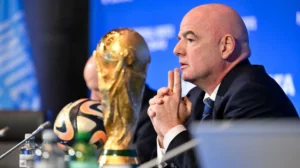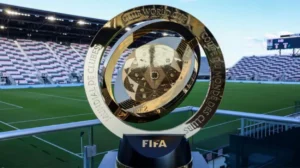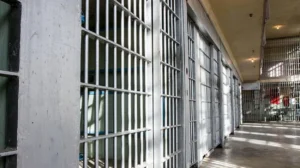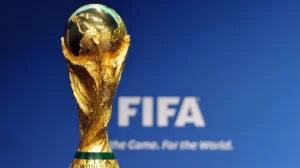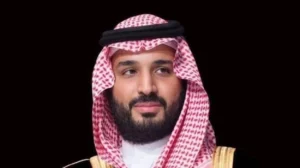- Home
- Why Boycott?
- Human Rights Violations
- Migrant Workers Exploitation & Kafala System Abuse
- Saudi Arabia’s War Crimes
- Freedom of Press and media censorship
- Torture And Unfair Trials
- Saudi Arabia’s Anti-Climate Agenda
- Bogus Stadium Infrastructure
- Sportwashing & Political image
- Saudi Arabia’s Unfair bidding Process
- FIFIA Corruption and Transparency issues
- Poor Treatment of LGBTQ community
- Security risks for spectators
- News
- Get Involved
- Contact Us
FIFA Corruption
The awarding of the 2034 FIFA World Cup to Saudi Arabia has sparked global outrage, raising serious concerns over corruption, lack of transparency, and ethical governance within FIFA. Critics argue that financial and political influences played a significant role in the decision, sidelining fair competition and human rights considerations.
Lack of Transparency in the Bidding Process
FIFA’s selection of Saudi Arabia as the sole candidate for the 2034 World Cup has raised red flags over a lack of fair competition. The rapid and unchallenged nature of the decision has fueled accusations of behind-the-scenes deals benefiting FIFA officials and sponsors. Many believe that the process was deliberately structured to ensure Saudi Arabia’s victory, shutting out potential bids from other nations.
Saudi Arabia’s Human Rights Concerns
A major factor fueling opposition is Saudi Arabia’s poor human rights record, particularly concerning freedom of speech, women’s rights, and migrant labor conditions. The country has been accused of sportswashing—using high-profile sporting events to improve its global image while continuing to suppress basic freedoms. Critics argue that FIFA, by endorsing Saudi Arabia as a host, is ignoring ethical considerations for financial gain.
Boycott Calls & Global Backlash
In response to FIFA’s decision, activists, human rights organizations, and football fans have launched boycott campaigns against the 2034 World Cup. These movements call on national teams, sponsors, and fans to reconsider their participation, arguing that supporting the event would legitimize corruption and human rights abuses. Some countries are even considering diplomatic actions, such as withdrawing from the tournament if ethical concerns remain unaddressed.
FIFA’s Troubled History of Corruption
This controversy is just the latest in FIFA’s long history of scandals, bribery, and corruption. The awarding of past World Cups to Russia (2018) and Qatar (2022) also faced allegations of unethical practices, and the pattern appears to be repeating with Saudi Arabia. FIFA’s reluctance to introduce independent oversight and transparency measures further fuels doubts about the legitimacy of the selection process.
The Future of Football’s Integrity
The decision to host the 2034 FIFA World Cup in Saudi Arabia raises a fundamental question: Is football being sold to the highest bidder? With growing public scrutiny and backlash, FIFA faces increasing pressure to restore trust in its governance and ensure that future World Cup bids prioritize fairness, transparency, and ethical considerations over political and financial deals. Whether the calls for a boycott gain momentum remains to be seen, but the controversy surrounding FIFA’s decision is unlikely to fade anytime soon.

